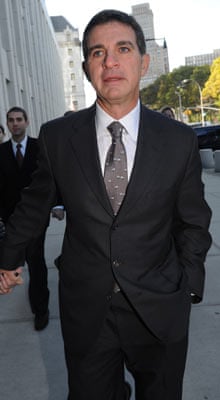
A pair of maverick Bear Stearns hedge fund managers lied to clients "over and over again" to protect their multimillion dollar pay cheques, exchanging secret emails to orchestrate a $1.6bn fraud as their funds imploded in the global financial crisis, a US jury heard yesterday.
At a federal court in the New York borough of Brooklyn, financiers Ralph Cioffi and Matthew Tannin became the first Wall Street bankers to stand trial in a criminal case arising from the credit crunch. The men, who protest their innocence, are accused of hiding the true picture from clients as their two high-flying hedge funds fell to earth - an event which ultimately contributed to the collapse of the 85-year-old brokerage Bear Stearns.
Prosecuting counsel Patrick Sinclair told jurors that the duo deceived investors "from France to Chicago, from Switzerland to right here in Brooklyn", and flouted the "special relationship of trust" that comes with looking after other peoples' money.
"These two defendants lied to their investors to save their multimillion dollar bonuses," said Sinclair. "In the United States of America, that is a crime. It's a serious crime and it's called securities fraud."
Cioffi, 53, and Tannin, 48, ran two Bear Stearns funds which, at their peak, managed $20bn of assets. During the good times, the court heard that they were well rewarded - Cioffi, a senior fund manager, earned a total of $32m in 2005 and 2006 while Tannin, who has described himself as the "little cheese" of the two, received $4.4m.
For 41 consecutive months, the pair enjoyed remarkable success as their funds consistently climbed in value. But when the US property market began to wobble in early 2007, their mortgage-stuffed funds faced difficulty.
Privately, the pair exchanged emails describing the market as "toast" and "pretty damn ugly". But on conference calls with clients, they are accused of lying about the number of investors pulling out of funds, and of hiding the truth about the amount of personal money they had at stake.
"They lied over and over again to lull investors into a false sense of confidence," said Sinclair, highlighting one anxious message sent one morning from Tannin's personal Google Mail account to a Hotmail account in the name of Cioffi's wife. "By lying, they stole from their investors the opportunity to make fully informed decisions."
The case, which is expected to last six weeks, gives the US government the task of explaining the inner workings of hedge funds and collateralised debt obligations to a jury of seven men and five women, who were carefully screened for any prejudice against Wall Street bankers.
Asked for his views, one prospective juror said that "people on Wall Street receive exorbitant bonuses", while another suggested that "large financial institutions always try to bend the rules".
District judge Frederic Bloc repeatedly warned: "This is not a case to give people an opportunity to get revenge because they're angry at Wall Street."
Legal experts say that prosecutors face a tough task in proving the men stepped over a legal line between aggressive marketing and fraudulent deception. Defence lawyers for the two men argue that they are being victimised, and that the government is "cherry picking" a handful of sentences, out of context, from thousands of emails.
Cioffi's counsel, Dane Butswinkas, conceded that the defendants had made mistakes, but argued that they were being punished for failing to anticipate "the greatest financial crisis since the Great Depression".
"It's always easier to call the right play on a Monday morning, after the big game on a Sunday," said Butswinkas. "It's always easier to pick the right investment strategy after the fact. Hindsight is 20-20."
Attempting to cloud the prosecution's picture of the two men running the funds virtually single-handedly, Butswinkas produced tables of Bear Stearns' management structure, bulky disclosure documents and a picture of the brokerage's busy trading floor. He said Cioffi and Tannin were not simply conspiring in a "bat cave" of their own.
"This was a talented group of people who had faith in themselves and in their team," said Butswinkas, who stressed Cioffi's humble roots - the former fund manager grew up in a small town in Vermont, worked as a bus boy in his family's Italian restaurant and did odd jobs as a truck driver and a cashier to pay his way through college. He arrived in New York in the 1980s to embark upon a career as a banker with just $200 in a "slightly worn out pouch".
Cioffi and Tannin, both in dark suits, listened intently to proceedings and were accompanied to court by large contingents of family. Tannin faces a maximum sentence of 20 years for fraud, while Cioffi, who faces a further charge of insider dealing, could face 40 years imprisonment.
The progress of the trial will be watched keenly by scores of other big names on Wall Street who are facing official investigations for questionable business practices in the run-up to the credit crunch. The Consumer Federation of America says there is a popular desire for financiers to be held "accountable" for the spectacular eradication of wealth caused by the global credit meltdown.